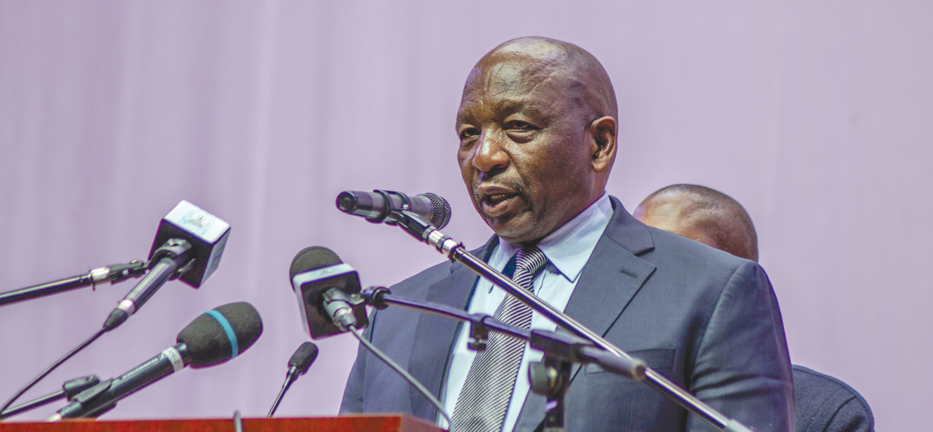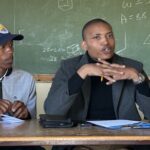Despite Prime Minister Sam Matekane publicly declaring this week that youth unemployment is a national crisis, Newsday can confirm that Lesotho is not yet legally under a state of disaster.
Speaking during a national dialogue on youth unemployment held on Wednesday in Maseru at the ‘Manthabiseng Convention Centre, Matekane said the government views the issue as a crisis requiring urgent action.
“Let us remember that jobs are created by businesses and investors. The main responsibility of the government is to create a level playing field,” Matekane said.
“Unemployment, especially among young people — the government sees it as a crisis. As a result, the Cabinet, on the advice of the DMA, has decided to declare that youth unemployment is a disaster. Relevant ministries are already working to ensure that there is a legal declaration so that the work can start.”
He also called on young people to propose solutions: “Give us ideas on how to approach this issue so that we can overcome the disaster we are faced with.”
Following the Prime Minister’s remarks, the Government of Lesotho posted on its official social media platforms that: “The Cabinet, with the advice of the Disaster Management Authority (DMA), has decided to declare youth unemployment as a disaster.”
However, under Section 3 of the Disaster Management Act of 1997, a state of disaster must be formally declared by the Prime Minister on the advice of the DMA Board and must be published in the Government Gazette to take legal effect.
“If at any time it appears to the Prime Minister, on the advice of the Board, that any disaster in any area is of such a nature and extent that exceptional measures are necessary to assist and protect the public of such area or that circumstances are likely to arise making such measures necessary, he may declare that with effect from a date specified by him in such declaration, a state of disaster exists within the area defined in such declaration and such declaration shall be published in the Gazette,” the law states.
It adds: “The declaration of a state of disaster shall remain in force for a specific period as set out in the declaration and may be extended accordingly.”
Newsday’s efforts to verify whether Lesotho is officially under a state of disaster following Prime Minister Sam Matekane’s public declaration have revealed that no legal declaration has been made, as required by law.
Authorities who spoke to Newsday clarified: “We are not under a state of disaster yet. There are processes that need to be followed before such a declaration can be published in the Government Gazette. Until that happens, we cannot determine the duration or legal effect of something that does not yet officially exist.”
According to the Act, once a state of disaster is legally declared, the Chief Executive of the DMA is required to prepare a National Disaster Relief Plan. This plan must be agreed upon by the Board and approved by the Cabinet before it can be implemented and maintained.
Additionally, each District Secretary must prepare a corresponding District Disaster Relief Plan for their area, also subject to approval by the DMA Chief Executive.
The law further mandates that: “During a state of disaster, the Chief Executive shall prepare a Post-Disaster Reconstruction, Rehabilitation and Recovery Plan and, following its agreement by the Board and approval by the Cabinet, shall implement and maintain that plan at national and district levels as appropriate.”
However, Newsday has learned that none of these required documents, the National Disaster Relief Plan or District Disaster Relief Plans, are currently available, further confirming that the legal and administrative framework necessary to support the declaration has not yet been put in place.
Youth organisations hail declaration of unemployment as national disaster
In a statement released yesterday, a coalition of youth organisations in Lesotho welcomed “the Prime Minister’s declaration of youth unemployment as a national disaster”, crediting sustained advocacy, peaceful mobilisation, and legal action led by young people for the landmark decision.
“This declaration is a direct result of the united voice of young people from civil society organisations, political party youth leagues, and individuals who came together to demand a bold and lawful action under the Disaster Management Act of 1997,” the youth said.
“With over 48.8% of the youth unemployed, this crisis has claimed lives, dignity, and hope; but today we reclaim the narrative. This is not just a policy win, it is a declaration of truth,” they added.
They further noted that youth unemployment has, for years, been a silent catastrophe, shattering futures through mental illness, poverty, drug abuse, crime, and hopelessness.
Now, they said, it has been officially recognised as a national disaster, one that warrants urgent attention, allocation of resources, and structured recovery efforts.
“We thank the Office of the Prime Minister for hearing the cries of young people and responding to our call. We also honour every young person who stood up, spoke out, and marched forward with courage and conviction. To the youth of Lesotho, this is your victory. To the government, this is just the beginning — not the end,” the statement read.
They added that they now anticipate the development of a comprehensive Disaster Management Plan, including Disaster Relief Measures and a Youth Rehabilitation and Recovery Strategy, in accordance with Sections 5, 6, and 7 of the Disaster Management Act.
Youth unemployment a major concern — Finance Minister
When delivering the 2025/2026 Budget Speech earlier this year, the Minister of Finance and Development Planning, Dr Retšelisitsoe Matlanyane, highlighted youth unemployment as one of Lesotho’s most pressing challenges.
“I wish to bring to your attention a significant challenge that our country is confronting — youth unemployment,” she said.
Citing the 2024 Labour Force Survey, Matlanyane revealed alarming statistics that underscored the urgent need for intervention. Of the 760,230 Basotho aged 15 to 35, approximately 145,087 are currently unemployed.
“This figure is striking. Nearly 39 percent of our youth actively looking for work are unable to secure a job. This situation represents more than just numbers; it reflects postponed aspirations, unfulfilled potential, and futures that remain uncertain,” she said.
The Minister expressed particular concern over the gender disparity in youth unemployment. While the overall youth unemployment rate is 38.9 percent, young women face a higher rate of 40.8 percent, compared to 37.1 percent for young men.
“This gender disparity reflects deeper structural issues that we must address,” she added.
She also pointed to the low youth labour force participation rate, which stands at just 31.48 percent, meaning that only about one-third of the youth are employed or actively seeking work.
“This implies that many of our young people have become discouraged, with over 226,857 having given up looking for work altogether,” Matlanyane noted.
Despite the sobering figures, she emphasised that opportunities exist within the challenge. The Minister highlighted that while the formal sector currently employs only 87,849 people, the informal sector accounts for 461,873 jobs.
“This picture suggests there is significant room for expanding job creation within the formal economy, particularly through private sector-led growth in emerging sectors,” she said.
Matlanyane called for a multi-sectoral approach to create meaningful employment opportunities for young people, especially women, and to harness their potential in driving Lesotho’s economic transformation.
Summary
- Under Section 3 of the Disaster Management Act of 1997, a state of disaster must be formally declared by the Prime Minister on the advice of the DMA Board and must be published in the Government Gazette to take legal effect.
- “If at any time it appears to the Prime Minister, on the advice of the Board, that any disaster in any area is of such a nature and extent that exceptional measures are necessary to assist and protect the public of such area or that circumstances are likely to arise making such measures necessary, he may declare that with effect from a date specified by him in such declaration, a state of disaster exists within the area defined in such declaration and such declaration shall be published in the Gazette,” the law states.
- According to the Act, once a state of disaster is legally declared, the Chief Executive of the DMA is required to prepare a National Disaster Relief Plan.

Ntsoaki Motaung is an award-winning health journalist from Lesotho, specializing in community health stories with a focus on sexual and reproductive health and rights, as well as HIV. She has contributed to platforms like “Be in the KNOW,” highlighting issues such as the exclusion of people with disabilities from HIV prevention efforts in Lesotho.
In addition to her journalism, Ntsoaki serves as the Country Coordinator for the Regional Media Action Plan Support Network (REMAPSEN). She is also a 2023 CPHIA Journalism Fellow.










